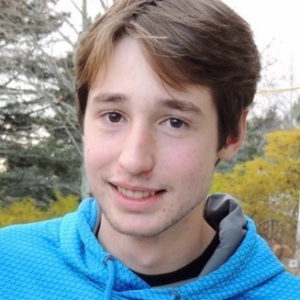If you were in Tim Hortons in Cape Breton this summer, you might have heard Linnaea Oland’s excited scream as she learned she was one of two recipients of the Harrison McCain scholarship—an accolade she now shares with fellow Nova Scotian Jude Pepler.
“I’m pretty sure I terrified every customer that was in the store at the time and my coworkers and my boss,” Oland laughs. “I just started jumping up and down, and they were all pretty excited for me … It meant and means a ridiculous amount to have won the scholarship.”
The award has a total value of $16,000 over four years. It is awarded to high school graduates with a minimum admission average of 80 per cent, documented financial need and a recognized desire to fund their education.
 Oland is the second generation in her family to attend King’s, as her mom is also an alum. Her recommendation and the university’s unique approach attracted Oland to the journalism program.
Oland is the second generation in her family to attend King’s, as her mom is also an alum. Her recommendation and the university’s unique approach attracted Oland to the journalism program.
“(The Foundation Year Program) was really appealing to me. I loved the idea of melding so many things together: history, philosophy, science and, obviously, literature. And I hadn’t heard of another program anywhere like it. I just thought it was so appealing.”
Growing up in rural Cape Breton fostered an early passion for the environment and sustainability. Though she always loved writing, Oland says she found it challenging to narrow down what she wanted to do after high school. Being glued to the news during the pandemic eventually shifted her interest to journalism and ignited a desire to raise awareness about important issues. That was when she realized how to combine her passions.
“I knew that I wanted a career that would allow me to give voice to others and use my writing to bring very important things to the forefront,” she says. “I love the idea of investigative journalism, especially focused on environmental issues.”
Although moving to a larger centre has been an adjustment for Oland, she’s enjoying Halifax and life at King’s. The journalism program, in particular, has surpassed her expectations.
“I didn’t expect it, even in the first few weeks, to be so insightful and have so many helpful tips,” she says. “I was surprised by the little details … and I think my favourite thing so far is the focus on Indigenous viewpoints and ethics … I had no idea that they were going to focus so much on that, and I am thrilled.”
In terms of her long-term goals, Oland says the CBC sits near the top, but her dream job would be to work for the independent news organization Al Jazeera.
“I find it to be full of fantastic journalism,” she says. “It is so broad and covers global events really well. Probably the least biased news network that I’ve come across.”
 Jude Pepler would likely be the first reporter on the scene of a zombie apocalypse, but for now, he’ll settle for reviewing horror flicks. The Dartmouth native began sharpening his writing chops during the pandemic with regular submissions to film websites, sharing his thoughts on public forums and eventually landed a paid gig for High on Films—a digital publication dedicated to exploring both mainstream and independent movies. Now, as a FYP student, he hopes to infuse a career in journalism with his love of the whimsical and macabre.
Jude Pepler would likely be the first reporter on the scene of a zombie apocalypse, but for now, he’ll settle for reviewing horror flicks. The Dartmouth native began sharpening his writing chops during the pandemic with regular submissions to film websites, sharing his thoughts on public forums and eventually landed a paid gig for High on Films—a digital publication dedicated to exploring both mainstream and independent movies. Now, as a FYP student, he hopes to infuse a career in journalism with his love of the whimsical and macabre.
Pepler says the idea of becoming a journalist had been on his mind since junior high school, but it wasn’t an English teacher who recommended King’s—it was his basketball coach.
“I’m as interested in basketball as I am in movies,” Pepler muses. “I grew up playing basketball, and that’s how I found out about King’s … (my coach) had actually been at King’s for journalism, so he recommended it to me. I made it my goal throughout junior high and high school to try and get there.”
Not only did Pepler achieve that goal, along with fellow first-year student Oland, Pepler is one of five Harrison McCain Scholars currently studying at King’s.
It was the essay prompt that piqued his interest in the scholarship: “An author has written that ‘Learning to live with ambiguity is learning to live with how life really is.’ Write an essay that tries to explain what this notion might mean. […]”
He says he approached the concept of society’s grey areas by focusing on the recent phenomenon of ‘cancel culture’—the practice of withdrawing support for public figures who go against the grain of popular opinion. This mindset lends itself to a black-and-white view of humanity without room for growth or learning from our mistakes, Pepler explains.
“We’re in a time right now where socially, everything is … changing. To adapt to that, you really have to keep an open mind,” he says. “There’s a lot of ignorance in the world, but that doesn’t mean people can’t change.”
In the context of a film, we, as audience members, do not expect the characters to have it all figured out in the first scene. Pepler says we need to give each other more grace in real life.
“It’s kind of a double-edged sword where you have to give people the chance to adapt and become more open-minded with time and not just jump to conclusions.”
Well into his first term at King’s, Pepler says he is adjusting to the increased course load and enjoying meeting people with similar interests.
“I’m liking it a lot. Everyone is really nice. I feel like I’ve learned a lot already,” he says. “The great thing about King’s is that you get to try everything.”
At the moment, Pepler remains torn between his love of movies and basketball, so it is unclear whether he will pursue a career in sports journalism or continue reviewing films. Regardless of his path, Pepler’s main goal is to foster a connection with his audience so that they keep returning to his writing.
“I’m definitely looking to grow,” he says. “I definitely want to hone more of a voice for myself so that I can create more opportunities and people want to come back to (my) writing … I’d like to have some kind of distinct voice that people want to listen to.”

